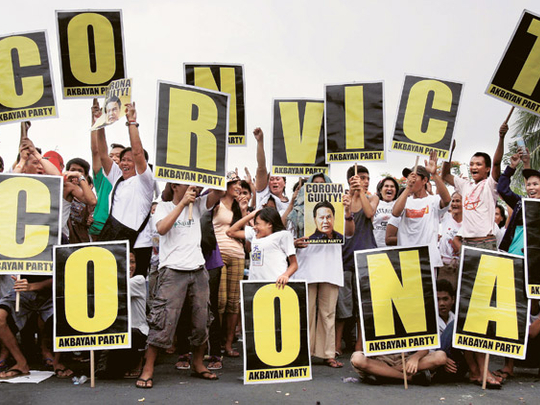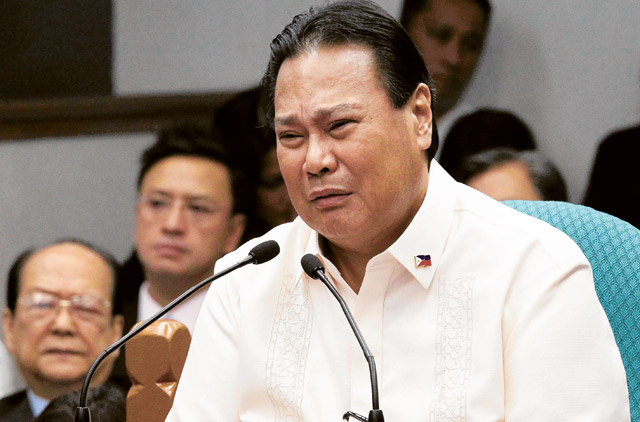
Manila: Senate on Tuesday rendered a guilty verdict on Chief Justice Renato Corona, a decision seen as putting a closure on a debacle that had been weighing down government for the last four months.
In a highly awaited decision, 20 of the 23 Senators sitting as an tribunal, convicted the top magistrate of betraying public trust and violating the constitution. The three others voted to acquit Corona.
Senate President Juan Ponce Enrile, who presided over all 44 sessions held by the to hear Corona’s case, said: “With full trust that the Almighty will see us through the aftermath of this chapter in our nation’s history, I vote to hold the Chief Justice, Renato C. Corona, Guilty as charged under Article II, Par. 2.3, and that his deliberate act of excluding substantial assets from his sworn Statement of Assets, Liabilities and Net Worth (SALN) constitutes a culpable violation of the Constitution.”
Disparities in the SALN are largely used by investigators as a basis to determine if an official is corrupt or has unexplained wealth.
Corona’s lawyers, led by Serafin Cuevas had earlier said the Chief Justice was not covered by the rule on foreign deposits because of a law supposedly safeguarding the secrecy of foreign currency deposits — Republic Act 6426.
But Enrile, a long-time corporate lawyer before serving a several term senator, said: “The so-called conflict of laws between R.A. Nos. 6713 and 6426 (the Code of Conduct for Public Officials and Employees) is more illusory than real. Section 8 of R.A. No. 6426 merely prohibits the examination, inquiry or looking into a foreign currency deposit account by an entity or person other than the depositor himself. But there is nothing in R.A. No. 6426 which prohibits the depositor from making a declaration on his own of such foreign currency funds, especially in this case where the Constitution mandates the depositor who is a public officer to declare all assets under oath,” he said.
Although there were a total of three impeachment articles (Article 3, which questioned the Chief Justice’s competence, integrity and independent; and Article 7 which alleged Corona was being biased when he ruled in a recent case involving former President Gloria Macapagal-Arroyo), these were dismissed with the affirmation on the impeachment Article 2.
Corona, 63, was appointed by Arroyo in May 2010 around the time she ended her six-year term of office.
The several months-long impeachment trial had been characterised largely by disorganised presentation evidence by the prosecution, which is composed of the member of the House of Representatives.
Earlier supposed evidence presented by the prosecution, which largely came from dubious sources, placed the amount of Corona’s dollar deposits at $40 million (Dh146.9 million). When Ombudsman Conchita Morales-Carpio was summoned by the Senate to provide information on Corona’s deposits, she said that the Anti-Money Laundering Council placed the amount at $10 million.
When Corona revealed the actual amount contained in his foreign currency deposits, last Tuesday, he admitted it to be at $2.4 million.
Senator Allan Peter Cayetano, in delivering his vote said that he cast his vote for Corona’s conviction, said that while the country had gone through one of its worse periods in its political history with the impeachment trial of the top magistrate, delivering the verdict was a painful necessity.
“We hope that something good will come out of this in the way of getting the government to be more transparent in its dealings… This trial is precedent setting,” he said.
Corona will go down in the country’s history as the first Supreme Court Chief Justice to be constitutionally ousted.
Since last week, he had been at staying at the Medical City hospital in suburban Pasig due to concerns over his health.













